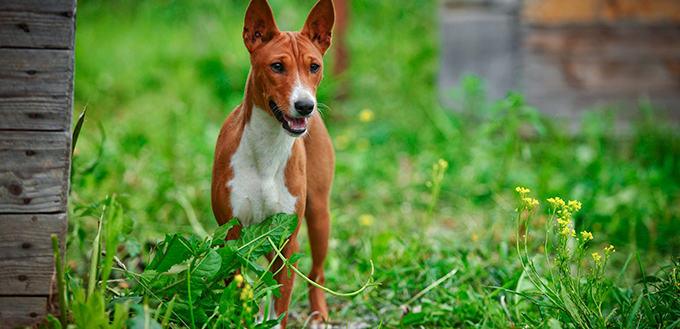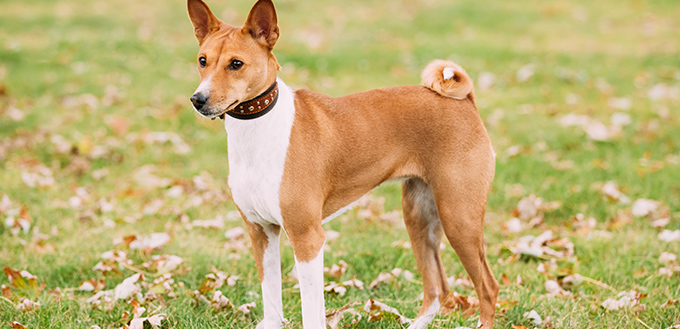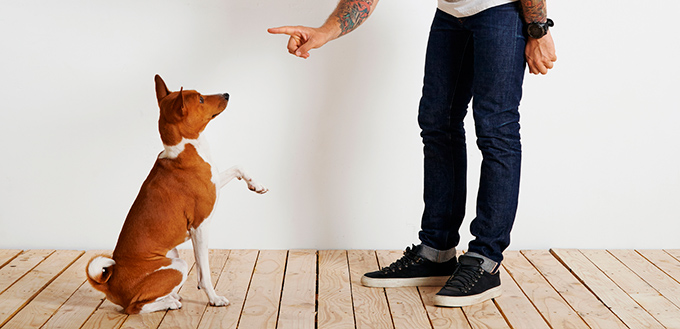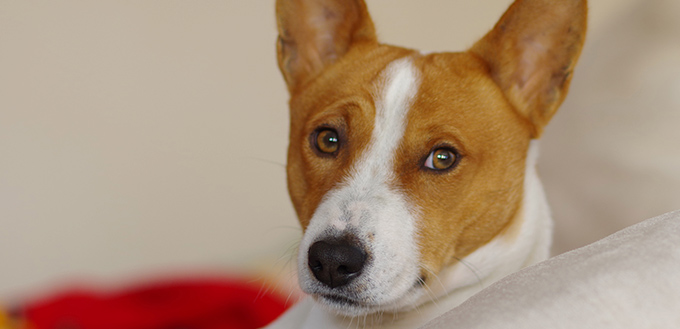The Basenji is a complex character! On one hand, they are a loyal companion who will fight ferociously to defend you. On the other hand, they are independent thinkers who have an irresistible urge to hunt. This can make them hard to train and means that they are not suitable for all families.
Nevertheless, if you are an experienced dog owner who is prepared to take on a challenge, you will reap the rewards. They require little grooming but need constant exercise and stimulation to keep them satisfied.
Here’s what you need to know about this unique and challenging breed before you take one on.

History of the Basenji
Basenjis are a truly ancient breed and may even be the oldest breed registered with the American Kennel Club. Paleontologists who have studied ancient Egypt have found evidence of domesticated dogs that looked remarkably like the Basenjis. Within Egyptian tombs, there are pictures and artifacts of Tesem dogs that have the pricked ears and tightly curled tails that we associate with Basenjis today.
When the Egyptian civilization collapsed, the Basenji evolved into a semi-wild dog. However, they were very useful to African tribes who exploited their hunting skills including their keen eyesight and sense of smell, and explosive speed. Their ability to leap vertically was developed when scouting for prey on the African grasslands and their reluctance to bark was essential when stalking prey. They were also good guard dogs and were continually alert for danger. Here they remained, isolated and unaltered by Western canine breeding practices until they were discovered by Congo explorers in the 1800s.
Early attempts to import Basenjis into Western countries were not successful. Their previous isolation meant that they had no immunity to common dog diseases and the first imported dogs died. Finally, in 1941, the breed was successfully imported to the US and they were quite widely bred. However, the breed has declined in popularity over the last 20 years and is now ranked as the 88th most popular breed in the US.
Quick Facts
To get you started, here are some quick facts about the intelligent and poised Basenji that may interest you:
- They live for around 13 or 14 years and despite the fact that they have hunting dog ancestry, they are prone to several health conditions.
- They have a compact and athletic appearance. Your adult male Basenji will reach around 17 inches in height whilst the female will grow to around 16 inches. When fully grown, they weigh around 22 to 24 pounds.
- They are upright and slender dogs and have a long stride that allows them to cover a lot of ground in a short time. Their coat is dense and short.
- They have dark, almond-shaped eyes and an attractive way of looking perpetually puzzled thanks to their raised eyebrows and forehead wrinkles.
- They hate to be surprised from behind so they don’t make great pets for families with young children.

Things You Should Know
The elegant Basenji is an athletic and highly intelligent dog but is one of the lesser-known breeds in the US. Due to some of their behavioral characteristics, they would not suit all families. If you are considering a Basenji as a pet for your family, here are a few things that you should know.
Training
Basenjis are very particular about cleanliness so you should have no problems house training them. Obedience training, however, is likely to be a lot more challenging. You need to remember that they were bred as bush-hunting animals where they had to work independently and make their own decisions. This means that ‘doing what they are told is not exactly high on Basenji’s list of priorities! They are rated as one of the breeds that are least responsive to verbal commands. This is not because they are unintelligent. It’s just that they like to be the one who decides what to do in any given situation. Convincing them that you are the boss is a challenge and something that only experienced dog trainers should take on.
It is essential that they are socialized with plenty of humans and dogs from a young age. They are very energetic and love a bit of mischief so they need a firm but fair approach. Where positive training techniques are consistently applied in an atmosphere where good behavior is rewarded, the results can be very good. Training sessions must be short though as they lose interest after 10 minutes or so.
You are unlikely to be able to ever trust them off the lead in an open space as their overwhelming desire to run off and the hunt will get the better of them. Also, they should not be left alone with children or other pets.
Feeding
Basenjis have a naturally slim physique and this needs to be maintained to keep them healthy. They are naturally very energetic and will burn off a lot of calories so you need to match their intake to what they burn off. They need a high-quality diet that is based on protein provided by meat. Try to avoid foods that contain meat by-products.
Related Post: Best High Protein Dog Food
They also need healthy vegetables and grains to provide a balanced diet that contains all the nutrients they need. Don’t forget that any treats that you use for training need to be taken out of their daily calorie allowance. Having said that, Basenjis are likely to ignore you even when you are offering treats so this should not become an issue!
Exercise
This is a breed that will keep you fit! They are very energetic and active dogs who will need a lot of exercises to keep them physically fit and to stop them from getting bored. If Basenjis get bored, they can become very destructive.
Ideally, you will have a large yard or garden that is securely fenced so that they cannot get out. You can entertain them here with ball games (for a full list of our favorite options, see our round-up of the best interactive puppy toys). They thrive on structured games and on canine sports such as tracking, lure coursing, and agility. They cannot be allowed to run free in public areas because they are highly unlikely to come back to you when you call them. They are irresistibly drawn to hunting and will give chase to whatever has caught their eye.
Related Post: Best Dog Agility Tunnel

Socialization
This is vital for such an independent breed that has its own ideas about what constitutes acceptable behavior. You must start this from a young age and it works best within a structured environment such as puppy classes.
Expose them to as many different dogs, humans, and situations as you can. Even then, they will require constant supervision and must never be left alone with small children or other household pets.
Grooming
This is a breed that takes great pride in its personal cleanliness! You will find them grooming themselves as much as a cat does. They lack any sort of doggy odor which is good news for the humans that they share a house with and means that they hardly ever need a bath.
They have a short coat that requires just one short brush a week with a soft-bristle brush to remove dead hair. They are moderate shedders so you should not have too many loose hairs around the house. Their nails will need to be trimmed and their teeth should be cleaned with a soft-bristled brush.
Related Post: Best Dog Nail Clippers
Health
Even though the Basenji is a working dog, they can suffer from quite a few health problems. Here are some of the more common ones.
Eye Problems
They can suffer from a congenital malformation of the retina called Coloboma which can lead to a loss of sight. Also, they can develop Corneal Luekoma which is an accumulation of white-colored material in front of the cornea. Other dogs get Persistent Pupillary Membrane which results in an angular-shaped pupil. Finally, a condition called Progressive Retinal Atrophy is a genetic condition that causes degeneration of the nerves in the retina and leads to blindness.
Intestinal Problems
Coliform Enteritis causes some of the bacteria in the large intestine to multiply rapidly and it leads to severe bloody diarrhea and shock. Immunoproliferative Intestinal Malabsorption is a condition where white blood cells enter the intestinal walls causing severe diarrhea and weight loss. The affected dogs need a special diet and medication.
Hernias
Inguinal Hernias are a rupture in the muscle that allows blood vessels and other structures to pass out of the abdominal cavity. Fat and even intestines sometimes pass through. You will be able to feel a lump under the skin in the groin. Most cases need to be corrected with surgery. An Umbilical Hernia is when the abdominal contents pass through the belly button which has become enlarged. It may need to be repaired surgically.
Blood Disorders
Factor IX Deficiency is sometimes called Haemophilia B and is caused by a lack of an essential enzyme needed for clotting the blood. Dogs with this condition will bleed very heavily after an accident or after surgery. It is more common in Basenjis than in many other breeds. Also, they can suffer from Haemolytic Anaemia which is a disease where the dog’s own immune system attacks its red blood cells. It can be associated with other health conditions such as Pyruvate Kinase Deficiency or can arise for no apparent reason. It causes anemia and a loss of energy and can lead to sudden death in some cases.
Other Conditions
Hypothyroidism is common in many pedigree breeds including the Basenji. The body’s own immune system attacks the thyroid gland and this causes the levels of thyroid hormone to fall. The dog will appear to be lethargic and will gain weight but they can also get skin problems and hair loss. This tends to be symmetrical and is mainly on the flanks.
Pyruvate Kinase Deficiency can cause hemolytic anemia. It is caused by a deficiency of an essential enzyme that is found in red blood cells. Without this enzyme, the red blood cells are fragile and get damaged easily. As they flow around the body, they can rupture and therefore cannot transport oxygen in the way that they should. The dog will be anemic and will not be able to exercise in the way that it usually can. They will also appear breathless.
Finally, Renal Tubular Dysfunction (which is also called Fanconi Syndrome) is very common in this breed. More than three-quarters of all dogs with this condition are Basenjis. The tubules in the kidney stop working properly so non-waste products are not reabsorbed. This leads to a lack of essential nutrients including protein and glucose. Dogs with the disease will lose weight and become very thirsty. They are also lethargic and have no appetite. It requires treatment by a vet but it can take a while to get it under control.

Temperament
The Basenji breed can make excellent family pets but only for the right family. They tend to become devoted to one human but will be fond of the rest of the family as well. They are not suitable for families with young children because of their powerful hunting instinct.
They are very brave, despite their small size, and will defend you ferociously if they feel you are being attacked. They can be aloof with strangers so don’t expect them to greet your distant relatives as if they are long-lost friends! They don’t actually like attention from humans that they do not know. This is why socialization is so vital.
They get very bored if they are left alone for long periods and hate to be separated from their human family. Boredom is a real issue for this breed and they become very destructive even if you are home. They need a lot of attention and walks on the leash to keep them occupied and that requires a lot of commitment. Only those who have thoroughly researched the breed and who understand their temperament should take them on.
Sources:
- Basenji, PetMD
- Interesting Facts About Dogs, The MSPCA–Angell






Our 4 yr old Basenji is kind of a rescue; we got her from a family who could no longer keep her. We take her for multiple walks each day. She is very leash reactive when meeting some dogs. We can talk her thru meeting some of the quieter dogs on a walk, but a few she really truly does not like.& reacts badly. It’s like she just “sees red” and can’t control herself. We have started carry HVT with us and say ‘Luna here” & she will look at us and sit for a treat and can sometimes be distracted. Sometimes not.. My husband can handle her better than I can, and she has bitten me twice while in her “seeing red” state, as she is very strong and I cant hold her at bay. Any advice about her leash reactions? Thank you! Pam